
Guests
- Marcy Wheeleran independent journalist who covers national security and civil liberties. She runs the website EmptyWheel.net.
Links
Attorney General Jeff Sessions has recused himself from any investigation into last year’s presidential campaign, following reports he met twice with Russia’s ambassador to the U.S. at a time when he was serving as both a senator and a campaign surrogate for Donald Trump. The revelation directly contradicts Sessions’ sworn testimony to Congress in January that he did not meet with any Russian officials in the run-up to November’s election. On Thursday, Sessions called charges he lied under oath “totally false,” and said he failed to mention the meetings with Ambassador Sergey Kislyak because the two did not discuss the campaign. Meanwhile, on Thursday, The New York Times revealed that Flynn and Trump’s son-in-law and senior adviser, Jared Kushner, held a meeting at Trump Tower with the Russian ambassador ahead of the presidential inauguration. “Do those relationships risk posing undue influence on him, going forward? Possibly bribery or some kind of coercion on policy?” asks Marcy Wheeler, an independent journalist who covers national security and civil liberties at EmptyWheel.net.
Transcript
AMY GOODMAN: Attorney General Jeff Sessions has recused himself from any investigation into last year’s presidential campaign, following reports he met twice with Russia’s ambassador to the U.S. at a time when he was serving as both a senator and a campaign surrogate for Donald Trump. The revelation directly contradicts Sessions’ sworn testimony to Congress in January that he did not meet with any Russian officials in the run-up to November’s election. On Thursday, Sessions called charges he lied under oath “totally false,” and said he failed to mention the meetings with Ambassador Sergey Kislyak because the two did not discuss the campaign.
ATTORNEY GENERAL JEFF SESSIONS: I was taken aback a little bit about this brand-new information, this allegation that surrogates—and I had been called a surrogate for Donald Trump—had been meeting continuously with Russian officials. And that’s what struck me very hard, and that’s what I focused my answer on. And in retrospect, I should have slowed down and said, “But I did meet one Russian official a couple of times. That would be the ambassador.” Thank you all. Take care.
AMY GOODMAN: On Thursday night, Fox News host Tucker Carlson interviewed Jeff Sessions.
ATTORNEY GENERAL JEFF SESSIONS: I think I’ve performed exactly correctly for an attorney general of the United States.
TUCKER CARLSON: Now, you were a foreign policy adviser—in fact, you were the chairman, I think, of the foreign policy advisers—to now-President Trump. In that capacity, do you remember conversations that you had, as a campaign, about Russia? And was there any—did you have any belief that they were putting their thumb on the scale, rooting for President Trump over Hillary Clinton? What were your conversations about Russia?
ATTORNEY GENERAL JEFF SESSIONS: I never had any conversations about—you know, with the Russians about this campaign and putting—them assisting in the campaign or anything like that. I went out and spoke, and I—
TUCKER CARLSON: Right.
ATTORNEY GENERAL JEFF SESSIONS: —campaigned for Trump, but I was not involved in anything like that, you can be sure.
TUCKER CARLSON: But did the campaign—I guess my question is: Did the campaign believe that the Russian government, the Putin government, favored Trump over Clinton in this race?
ATTORNEY GENERAL JEFF SESSIONS: I have never been told that, that I—I’ve never been told that.
TUCKER CARLSON: Do you think they did?
ATTORNEY GENERAL JEFF SESSIONS: I don’t have any idea, Tucker. You’d have to ask them.
AMY GOODMAN: Many Democratic lawmakers are still calling for Attorney General Jeff Sessions to resign, but President Trump has said the attorney general has been the victim of a, quote, “total witch hunt.” Sessions’s recusal comes less than three weeks after Trump’s national security adviser, Michael Flynn, resigned, after it was revealed he had discussed sanctions in a call on December 29th with the Russian ambassador, then lied to Vice President Mike Pence and other top White House officials about it. Meanwhile, on Thursday, The New York Times revealed that Flynn and Trump’s son-in-law and senior adviser, Jared Kushner, held a meeting at Trump Tower with the Russian ambassador ahead of the presidential inauguration.
We’re joined now by Marcy Wheeler, an independent journalist who covers national security and civil liberties. She runs the website EmptyWheel.net.
Marcy, it’s great to have you back with us. Can you talk about what you think is most significant in this whirlwind of allegations and now a recusal from Attorney General Jeff Sessions?
MARCY WHEELER: As people think about it, it’s helpful to think about the three things that we should be concerned about with Russia and Donald Trump. And the first is whether or not anybody on his campaign was involved in the hack of Hillary Clinton, whether or not they were kind of cooperating with the Russians. The second one is whether—we know, and Trump was very open, about his opening to Russia, his willingness to negotiate with Russia. The question is whether there was any kind of quid pro quo, whether there was any kind of inappropriate influence to get that outcome. And then the third is that Trump has these business associations going back decades with kind of shady businessman who have ties to Russia. The question in there is: Do those relationships risk posing undue influence on him, going forward? Possibly the, you know, bribery or some kind of coercion on policy?
And all of these discussions about the meetings with the ambassador—and that’s most of what we’re talking about, Amy, is that, you know, over and over again, various Trump aides or campaign people or associates, what have you, met with the Russian ambassador to the United States. And that, in and of itself, is not suspect. People meet with ambassadors all the time. In fact, Mike McFaul, who was Obama’s ambassador to Russia, keeps saying that. He’s a—he’s a hawk on Russia, but he keeps saying we should not make it criminal to meet with Russians. What’s tricky here is, Trump’s people have gotten questions, over and over again: Did you meet with X, Y and Z? Did you meet with X, Y and Z? And there’s always—as there is with Attorney General Sessions, there’s always this obfuscation about it. And that raises questions about whether those meetings with Ambassador Kislyak were on the up and up or whether there was something more going on.
With regards to Sessions’ recusal, it’s a very narrow recusal. And there was some bad reporting on this yesterday. Everyone’s like, “Well, he’s recused on everything that has to do with X, Y and Z.” You know what? Actually, all he said is that he’s recusing from anything having to do with the elections. And so, for example, he’s already been asked, “Would you recuse yourself from any ongoing investigation of Mike Flynn’s discussions with Russia in the transition period?” And he didn’t answer that. And, you know, laying out what I just did, that there are these questions of business associations, there are these questions of quid pro quo to change our policy toward Ukraine, those aren’t election-related per se, unless they were quid pro quos to elect Trump in order to implement this Ukraine policy. And Sessions hasn’t recused from that. And so—and those are, frankly, I think, where some of the biggest smoke is. So, he hasn’t recused from that yet. He actually was asked twice during his confirmation process about ties to Russia. The one he addressed yesterday was a question in the hearing from Al Franken about whether he, as an election official, met with any Russians, which, as you pointed out, he actually did.
AMY GOODMAN: Marcy, let’s go to that clip from the confirmation hearing in January, when then-Senator Jeff Sessions was asked by Minnesota Senator Al Franken whether he knew of contacts between Trump campaign officials and Russia’s government.
SEN. AL FRANKEN: If there is any evidence that anyone affiliated with the Trump campaign communicated with the Russian government in the course of this campaign, what will you do?
SEN. JEFF SESSIONS: Senator Franken, I’m not aware of any of those activities. I have been called a surrogate at a time or two in that campaign, and I didn’t have—not have communications with the Russians.
AMY GOODMAN: So, as you were saying, Marcy, often it’s not the underlying act, which wouldn’t have been a terrible thing for him to say yes, but it’s the cover-up.
MARCY WHEELER: Right, and that he answered only that question, which, as you pointed out, in Cleveland, a bunch of Trump—there was an event for ambassadors, and a bunch of Trump’s foreign policy people were involved. Some of them are the people about whom there are further allegations, that are yet unproven, of ongoing discussions with the Russians. The point is, a bunch of ambassadors in the room. Trump’s people give their dog and pony show. Afterwards, there are some more conversations, maybe not substantive, but with respect to that is, at that—you know, at that time, the Republican Party was changing their platform to be more favorable to Russia. And so, again, was there something about those conversations that led the Trump campaign to change that platform? We don’t know. Those are the questions that should be answered.
AMY GOODMAN: Now, what about the Jared Kushner, Mike Flynn, who’s now out as national security adviser, meeting in December at Trump Tower with the Russian ambassador? What is the significance of this? What is known at this time about this? The White House is putting out this information.
MARCY WHEELER: Well, it’s not clear that there is that much significance. There’s being much made about the fact that Kislyak didn’t come in through the front door of Trump Tower. A lot of people didn’t come in through the front door of Trump Tower during the transition period. And remember, there was that meeting with the tech CEOs with Trump. A couple of them didn’t come through. I think Tim Cook maybe came through the basement entrance. Does that make Tim Cook a Russian spy? Probably not. You know, the point—in fact, I’d say definitely not. But the point is that Trump is not being very forthcoming with these relationships. And there’s this drip, drip, drip of yet another tie.
The Kislyak ones, I think, we have—we don’t have to be all that worried about. It is the job of the ambassador of any given country to wander around and have as many conversations and, frankly, to try and help out his country. The real questions have to do with whether there’s any kind of quid pro quo for Trump to change. I mean, again, Trump ran on becoming more friendly to Russia. Trump—you know, you may disagree with the policy, but Trump was pretty open about being willing to negotiate on Ukraine, as distinct from Hillary Clinton, who was very much a hawk on it. He didn’t hide that from voters. Presidents are allowed to shift and change our foreign policy. And Trump has done so in other ways that ought to invite scrutiny—for example, with One China policy, where there’s been almost no attention, and there probably should be, because we know there were lots of conversations leading up to that.
But the point is, though, that we need to have a way to get to these answers. Trump’s people aren’t giving it to us. Sessions, his recusal is only partial. And, frankly, there are reasons to worry that the congressional inquiries—there’s one in both the Senate, and the House rolled out one yesterday morning. Devin Nunes, in particular, who’s the House intelligence chair, you know, clearly doesn’t want to have an investigation into Donald Trump. He was—he was a transition official. Richard Burr, head of the Senate Intelligence Committee, was on that same national security advisory committee. And so, what we need is to ensure that those three inquiries—the intelligence committees and the FBI, which is ongoing—that they are able to follow the evidence where they go. And we do have good reason to question whether we’re in that position right now.
AMY GOODMAN: I want to go to Jeff Sessions being interviewed by Tucker Carlson again last night on Fox News.
TUCKER CARLSON: So, the president, whom you serve, has described these questions as a “witch hunt” and has said that we need to investigate the leaks that have led to this and to a bunch of these different stories. Do you agree with that?
ATTORNEY GENERAL JEFF SESSIONS: Well, we are having a lot of leaks today in Washington that I do believe are troubling. A lot of it would appear to be in violation of the law. And it’s an unhealthy trend, and we’ve got to do better about it. I do believe every department needs to take a greater interest in maintaining proper security.
TUCKER CARLSON: Do you see this as a witch hunt?
ATTORNEY GENERAL JEFF SESSIONS: I don’t think what was said about that meeting I had with the Russian ambassador was legitimate. I think it was hyped beyond reason, and I think it was unfair, and I was glad to be able to address it today.
AMY GOODMAN: That’s Attorney General Sessions responding to Tucker Carlson. Marcy Wheeler?
MARCY WHEELER: You know, the leaks are an interesting thing. And this is something that, again, Devin Nunes, House intelligence chair, is really pushing hard, because we’re getting leaks of pretty sophisticated intelligence, even wiretap evidence. And, you know, there is a reason to be concerned that you can be picked up on a FISA wiretap and have the contents of it show up on The New York Times. That said, the way to stop the leaks, if you’re the Trump administration, is to appear like you’re not fighting this investigation tooth and nail. And they are.
And again, you know, I’m not terrifically sympathetic with Jeff Sessions, because he was asked twice—once in person and once actually in writing by Pat Leahy on an even broader question—and, you know, if you’re asked in writing, did you have any contacts with the Russians, and you—and that’s when you have aides to go through your paperwork and figure out what you did in Cleveland and figure out who’s been in your office—and you say no then, then—you know, then there is reason to ask why you were not fully forthcoming in your confirmation hearing.
AMY GOODMAN: I wanted to ask you about this other concern of a group of Democrats, the leadership on the House committee probing Russia’s efforts to interfere with the U.S. election. People like Adam Schiff, the Senator Feinstein of California are saying that the FBI is refusing to cooperate in handing information over—very willing to talk about investigating Hillary Clinton and then saying, a few days before the election, no, they weren’t. But when it comes to this, what about this, Marcy Wheeler, the clash of an intelligence agency with Congress?
MARCY WHEELER: You know, I’m a little bit less worried about this than those Democratic leaders are. And that’s partly because I’ve covered Jim Comey for years, and he’s very self-righteous. He likes to think of himself as this great crusader. Not necessarily a good thing as FBI director. I said that when he was confirmed under the Obama administration. But Democrats, at that point, thought he was—you know, he was pure and great. The Hillary investigation was public. Congress was involved in it. Yes, it was leaking like a sieve. And I do—you know, what Jim Comey did last July, and follow-up in October, was completely inappropriate. You know, don’t get me wrong. That was the unusual thing. But it was—I think it should be treated differently from an ongoing counterintelligence investigation. I mean, there are people who, for example, might be sources named in the dossier that Christopher Steele, a former MI6 agent who this dossier got leaked by BuzzFeed in January—there are people who might be sources in that who have have since died, in suspect circumstances. Several—four, actually—Russians have been charged with treason, with allegations that they’re tied to this investigation. The reason you don’t want a counterintelligence investigation to be shared with a Congress that is obviously leaking is because stuff like that—I mean, not only can the targets in the investigation find out and work to undercut the investigation, but people can get killed or charged with treason. And that’s not going to help us get to the bottom of this. So, you know, Pelosi, Schiff are absolutely right to be furious at Comey for what he did against Hillary Clinton last year. I’m not excusing that at all. But they should at least take a step back and think about whether they want the FBI investigation to be successful or whether they want it to be politically damaging, because those may be two different things.
AMY GOODMAN: Set aside the hacking of the election, when it comes to Donald Trump’s business interests and this whole question of, you know, is he invested in Russia, is there something we should understand why he’s so favorable to Vladimir Putin, that the question is really: Do they have something invested in his projects, everywhere from Trump SoHo to his buildings when he couldn’t get, you know, credit extended from banks because he had declared bankruptcy so many times and had so much financial problems that the oligarchs supported him? And deep concern about what his financial obligations are to them and how this fits into this bigger story of him not releasing his tax returns and not being transparent, why people are so concerned, separate from the question of whether Russia hacked the elections.
MARCY WHEELER: Right. I think that is something people should—and they’re distinct issues, as you pointed out, and people should remember that they’re distinct issues, because what we’re talking about with those business concerns—and it’s not just Russia. Again, this is an area where we should have as many questions about China, if not more so, than Russia, although some of his closest associates—you talked about the SoHo project—are tied to Russia and do have ties to the Mob. And that is a very fair question that we should be able to get answers to. Does he have relationships with people who have some kind of sway over him, over Trump, the brand? And if so, is that going to lead him to make decisions that he otherwise might make—might not make?
But, you know, the other thing to remember is, Trump is, you know, sort of authoritarian. He is, culturally, very similar to oligarchs, whether they’re Russian or Chinese or what have you. And we need to distinguish those two things. The shady business deals, definitely worth interrogation. Is the fact that he is culturally authoritarian and racist and so on and so forth—those are all things that were true before Russia hacked the election, for example. So, it just takes some nuance, I think, to remember what we really should be able to get answers on, need to be able to get answers on, and those things which are Donald Trump being Donald Trump and being kind of straight up about who he is and who voters, for better or worse, elected in November.
AMY GOODMAN: Are you concerned—we just have 30 seconds—of a new kind of Cold War developing, led by Democrats, that could be used to justify, interestingly, what Donald Trump is pushing for, the president, who’s more favorable to Russia, which is a nuclear arms race, a new nuclear arms race, and a massive increase in the Pentagon spending?
MARCY WHEELER: And not just that, but also, I mean, as Mike McFaul, former ambassador to Russia, has said, it should not be illegal to speak to Russians. That’s not illegal in this country. And if Democrats are pushing for it to be illegal, that’s a problem, because that’s when we get into this level of suspicion for just interchange, which we should be in support of. Right.
AMY GOODMAN: Marcy Wheeler, I want to thank you for being with us, independent journalist who covers national security and civil liberties, runs the website EmptyWheel.net. This is Democracy Now! Stay with us.

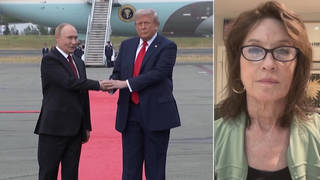

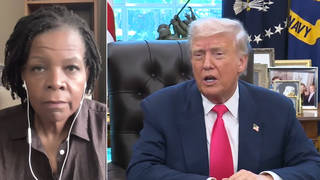
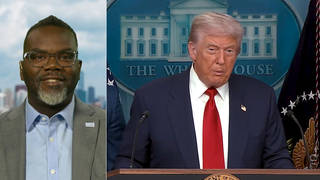





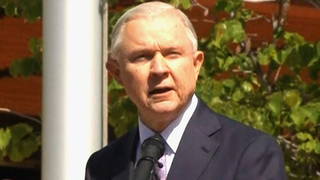
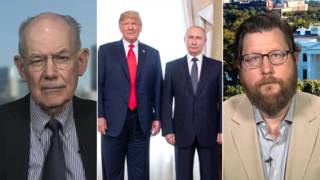
Media Options